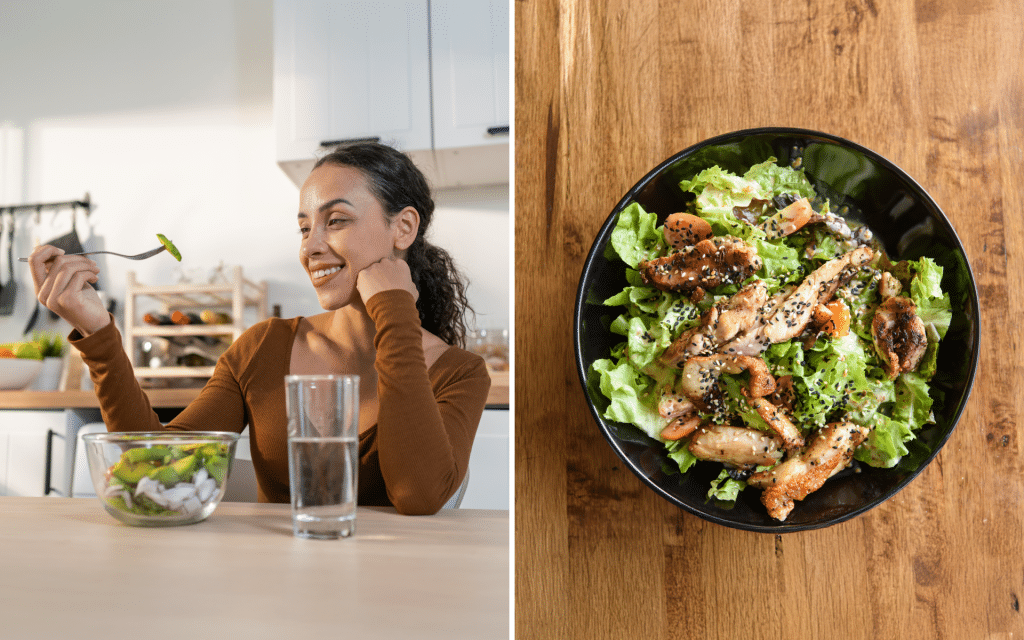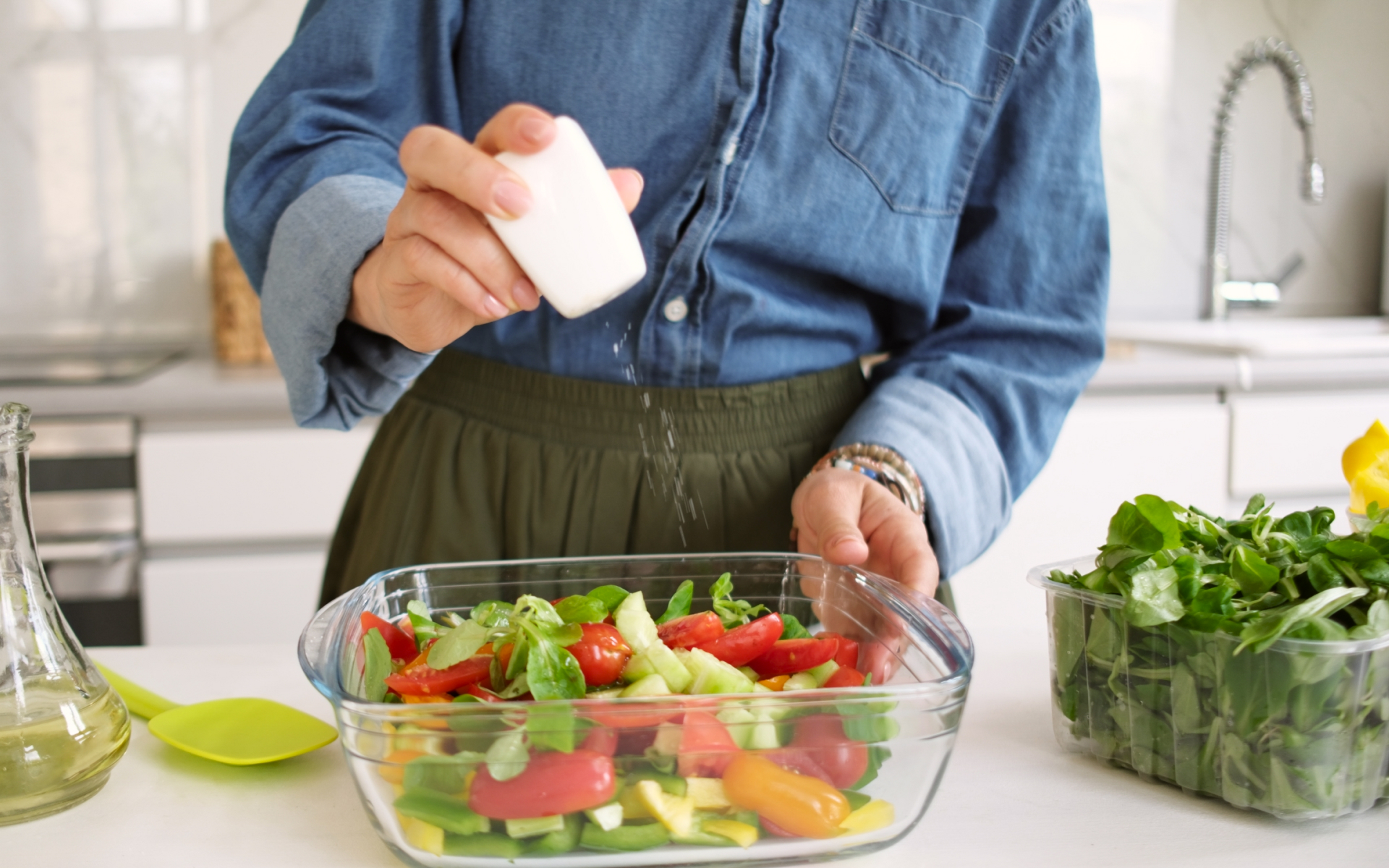Some people feel that fasting makes them feel lighter, more focused, and more efficient. However, running on an empty stomach is another story. Many people find it difficult to focus on fasting while working out as the exercises are more complex and draining without energy from food.
This guide shows you ways to build a reliable routine that can boost your physical performance and keep you feeling fed for longer.
What Is a Safe Way of Fasting While Working Out?
Fasted training means working out before you ingest any food, typically in the morning. Combining fasting with a structured fitness routine is believed to help burn excess fat. However, this technique isn’t easy or ideal for everyone.
Some people experience discomfort and low energy levels, while others have the stamina to perform longer or more intense workouts. If it’s done correctly, fasting while working out can be safe and effective for some people. The below tips can help:
- Choose the Right Fasting Window
Exercise is a key component in weight loss. Various types of fasting exist, all of which may benefit your fitness routine. The timing of your fasting window can impact your fitness performance, so choose the alternative that suits your needs.
For example:
- Intermittent fasting (IF) can be viable if you time your workouts during or right before your meal window. IF gives you a good structure for managing calories. Shorter fasts are easier to follow and maintain. You eat full, nutritious meals that promote satiety and adequate nutrition enables the body to handle more complex fitness schedules (1).
- Longer fasts usually work better with light workouts compared to intense training. You spend more time in a fasted state, which may boost weight loss. However, it can be very difficult for someone who is obese, struggling with food cravings, or needs energy for more intense workouts (2). If you want to incorporate longer fasts, you could do them occasionally and plan to do lighter physical activity on those days.
- Get Enough Electrolytes and Water
Electrolytes are essential for maintaining hydration. When fasting, you don’t get them from food like you normally do, and when exercising, you lose some of them through sweat.
Inadequate electrolyte and fluid balance can deplete the body of hydration, leaving you feeling exhausted and drained. A balanced diet can provide electrolytes and fluids (3).
Foods that replenish your electrolytes and hydration include:
- Cucumber
- Bananas
- Spinach
- Yogurt
- Almonds
- Kale
- Avocados
- Water
- Coconut water
- Herbal teas
- Pumpkin seeds
- Milk or fortified plant-based milk
BetterMe: Health Coaching app helps you achieve your body goals with ease and efficiency by helping to choose proper meal plans and effective workouts. Start using our app and you will see good results in a short time.
- Adjust Your Workout Intensity
Every workout regimen is different. Some individuals opt for low-pressure strength exercises and cardio, while others prefer challenging progressive overload and building muscle. When you fast and work out, you must choose an intensity that suits your fitness and energy level.
For example:
- Light aerobics (e.g. walking, swimming, or dancing) is a simple form of exercise that is best for beginners or while fasting.
- Fast cardio (e.g. running, brisk walking, jogging, or cycling) is more of a moderate workout and the best fit for fat loss and endurance training. It may require more energy than you have while fasting.
- Strength training is a moderate workout. You can exercise closer to your eating window to support muscle recovery.
- High-intensity workouts (e.g. HIIT or heavy lifting) are the hardest types of exercise. You need previous experience and high endurance. These are best done during your eating window, after you’ve had a meal that provides energy.
Read More: Intermittent Fasting And Working Out: Here’s What Science Actually Says About This Combo.
Is Fasting Good with Working Out?
Certainly, training during a fasting period is a common practice. Performing workouts when hungry drives the metabolism to access fat deposits for fuel. Fasting while working out creates a calorie-deprived state, possibly helping you shed excess pounds (4). However, weight loss still requires an overall calorie deficit, which is the difference between the total number of calories you burn and the total number you eat each day.
Whether you gain muscle, burn fat, or simply maintain a healthy body weight depends on how your body responds to fasting and your current calorie intake and energy expenditure. It’s also important to remember that exercise while fasting, or fasting in general, isn’t safe or appropriate for everyone. You should always talk to your healthcare provider before you make any major diet or lifestyle changes, particularly if you have health conditions or are taking any medications.
Is It a Good Idea to Work Out Fasted?
That depends on your personal goals, training type, intensity level, and individual tolerance.
Some people prefer to work out on an empty stomach because consuming food beforehand can cause discomfort. If you have a nourishing, well-rounded meal the night before, you may have the energy and stamina to exercise first thing in the morning, depending on the type, duration, and intensity of your exercise session.
Some studies have indicated that morning exercises after an overnight fast can significantly reduce body fat. However, exercising while fasting may also increase cortisol levels, which can make it more difficult to lose weight in the long term (6).
Some people may feel hungry and exhausted when they exercise on an empty stomach, in which case, it’s probably not worth it to exercise while fasting.
Having a meal that contains complex carbohydrates can provide the energy needed for more intense workout sessions. Just give yourself enough time to digest it before exercising so you don’t experience indigestion or discomfort.
You can experiment with your approach to intermittent fasting while working out and figure out what works best for you. If you’re too full to work out after breakfast, exercise beforehand. However, if you feel lethargic when exercising on an empty stomach, start your day with breakfast first. You can even vary your strategy depending on how you feel and what kind of workout you have planned for that day.
What Are the Negatives of Training Fasted?
Fasting while working out shouldn’t cause any significant problems for most healthy adults. However, depending on how your body reacts to fasting and the intensity of your workout, it can have drawbacks, including:
- Poor exercise tolerance: Without a pre-workout meal, your body has limited access to fuel. Fasted training can reduce peak performance, particularly for high-intensity or strength training workouts. You may not have as much energy, so the workout can feel more challenging.
- Emotional ups and downs: Exercising in a fasted state can raise cortisol levels, the stress hormone, and cause mood swings, making you feel irritated, tense, or anxious (7).
- Slower reaction time: Working out during a fast can make you feel lethargic and dizzy. Fasting can impair cognitive function and coordination when the body depletes its energy reserves.
- Muscle loss: Fasting and physical activity don’t have to negatively affect muscle function. However, fasting could contribute to a drop in lean muscle mass without adequate protein consumption during your meal window.
Read More: Intermittent Fasting and Muscle Loss.
Does Working Out Fasted Burn More Fat?
Working out in a fasted state is believed to promote weight loss as the body relies on stored fat for energy when glucose levels are low. However, the overall impact on fat loss depends on your exercise consistency and overall calorie intake.
Researchers studied whether aerobic exercises before eating (fasted) or after eating (non-fasted) had varying effects on weight loss and health markers. The study found that both exercise groups lost weight, reduced body fat, and improved cholesterol levels (8).
Another study produced similar results. Experts investigated 12 male students who ran on a treadmill at different intensities. Each participant exercised after eating (fed state) and after fasting (fasted state).
In the fasted state, low- and medium-intensity exercises burned more fat during the exercise than in the fed state. However, no significant differences appeared between the fed and fasted states with high-intensity workouts (9).
When to workout during intermittent fasting will depend on your fitness goals, workout type, and how you feel. If you want to lose fat and exercise on an empty stomach, you can do low-to-moderate physical activity before your first meal, but if you’re doing higher-intensity workouts, you should probably eat first. You can vary your approach depending on how you feel and the type of workout you have planned for the day. If your goal is to lose weight, you’ll still need to create a calorie deficit through diet and exercise, regardless of whether you exercise fasted or fed.
Am I Losing Muscle While Fasting?
With adequate planning, fasting can be a helpful tool for metabolic health and weight loss.
However, extended fasting could interfere with your muscle gain if you don’t manage it properly or fast for too long without adequate nutrition and physical activity.
The amount of muscle loss will depend on different factors, including:
- Duration of the fast – Short fasts should cause minimal muscle loss, while longer fasts can cause you to lose some muscle.
- Activity levels – If you do intense training while you fast but don’t get enough food during your eating window, you can lose muscle.
- Diet and training – Resistance training can preserve muscular strength, while optimal protein intake can curb muscle loss.
Can I Build Muscle While Fasting?
Yes, you can build muscle while you fast. Muscle preservation depends on your overall protein status and activity levels. A balanced approach with nutritious meals and resistance training can mitigate intermittent fasting muscle loss. Therefore, you should plan your meals, incorporate quality protein, and broaden your range of nourishing food sources.
Reasons why BetterMe is a safe bet: a wide range of calorie-blasting workouts, finger-licking recipes, 24/7 support, challenges that’ll keep you on your best game, and that just scratches the surface! Start using our app and watch the magic happen.
Can I Lift Weights While Fasting?
Yes, you can lift weights while fasting. However, you should prioritize eating protein-rich meals during your eating window and consider some of the drawbacks. For example, some people may feel exhausted and weak when working out while fasting for 24 hours, so you should choose a fasting regimen that works for you and doesn’t overexert your body.
Frequently Asked Questions
Will I be weaker if I work out fasted?
Everyone is different. Some people find it sustainable and comfortable to exercise while fasting, while others feel weaker, tired, and exhausted when working out on an empty stomach. It may also depend on the type and intensity of workout you’re doing, the length of your fast, and other factors that can vary from day to day. Choose an option that’s tailored to your needs.
Should I eat before a 5am workout?
Whether you should eat before your workout is dependent on your personal preferences and possibly the type and intensity of workout you intend to do. If you work out in the morning and want to eat first, it’s a good idea to wake up an hour early to eat breakfast. This gives the body enough time to process the food, which reduces the chance of stomach discomfort.
Can I work out while fasting for 3 days?
Light physical activities shouldn’t cause problems for shorter fasts. However, when you’re doing extended fasts, your body requires you to replenish nutrients and water. When there’s not enough fuel, you may want to avoid exercise. If you’re planning a long fast, talk to your healthcare provider first.
Does fasting burn fat or muscle?
Weight reduction can result from both lean and fat mass loss. However, the specific impact on fat or muscle depends on other factors, such as your activity level, diet, and fast duration. You must consume enough protein and exercise regularly to maintain muscle.
Does coffee break a fast?
In most cases, a standard black coffee shouldn’t break a fast. However, if you add flavorings, cream, sugar, or other ingredients, the coffee can affect your blood sugar and cause an insulin response, thereby breaking the fast.
The Bottom Line
Although fasting and exercise can effectively burn fat and boost metabolic function, people can react differently to fasting. It’s important to listen to your body and adjust the intensity and duration of your workouts and fasting times as necessary. It’s also important to talk to your healthcare provider, particularly if you have any health conditions or are taking any medications.
DISCLAIMER:
This article is intended for general informational purposes only and does not serve to address individual circumstances. It is not a substitute for professional advice or help and should not be relied on for making any kind of decision-making. Any action taken as a direct or indirect result of the information in this article is entirely at your own risk and is your sole responsibility.
BetterMe, its content staff, and its medical advisors accept no responsibility for inaccuracies, errors, misstatements, inconsistencies, or omissions and specifically disclaim any liability, loss or risk, personal, professional or otherwise, which may be incurred as a consequence, directly or indirectly, of the use and/or application of any content.
You should always seek the advice of your physician or other qualified health provider with any questions you may have regarding a medical condition or your specific situation. Never disregard professional medical advice or delay seeking it because of BetterMe content. If you suspect or think you may have a medical emergency, call your doctor.
SOURCES:
- Beneficial effects of intermittent fasting: a narrative review (2022, nih.gov)
- Efficacy of Fasting in Type 1 and Type 2 Diabetes Mellitus: A Narrative Review (2023, nih.gov)
- The Effect of Ramadan Fasting and Physical Activity on Body Composition, Serum Osmolarity Levels and Some Parameters of Electrolytes in Females (2013, nih.gov)
- Exercise Training and Fasting: Current Insights (2020, nih.gov)
- Effects of Fasting on Metabolic Hormones and Functions: A Narrative Review (2024, nih.gov)
- Comparison of the effects of acute exercise after overnight fasting and breakfast on energy substrate and hormone levels in obese men (2015, nih.gov)
- Effects of Intermittent Fasting on the Circulating Levels and Circadian Rhythms of Hormones (2021, nih.gov)
- The Effects of Six Weeks of Fasted Aerobic Exercise on Body Shape and Blood Biochemical Index in Overweight and Obese Young Adult Males (2022, nih.gov)
- Effects of Low/Medium-Intensity Exercise on Fat Metabolism after a 6-h Fast (2022, nih.gov)












